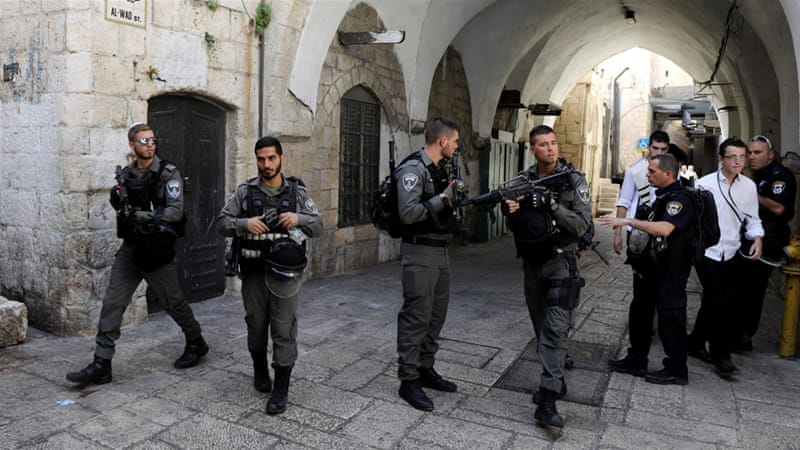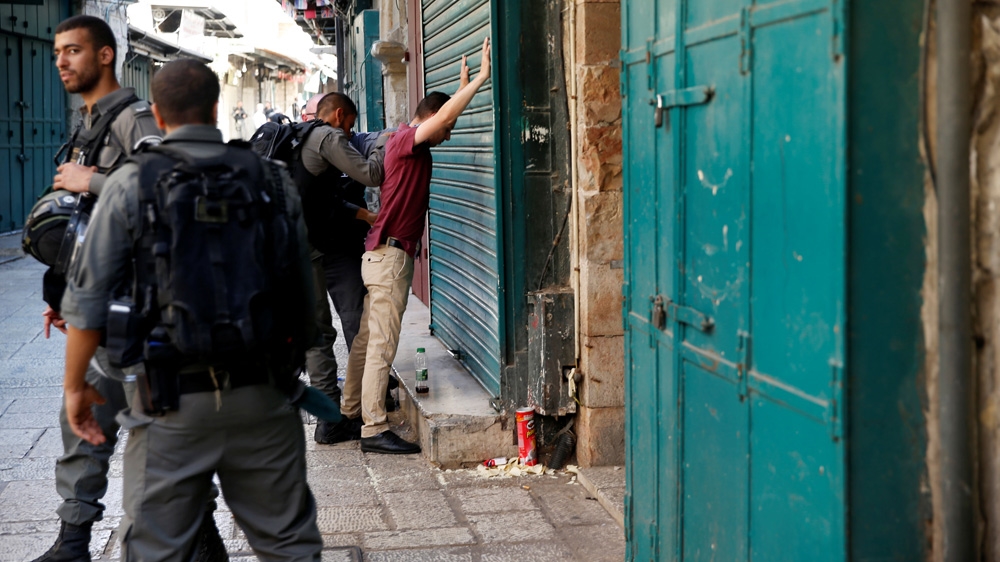Closing Al Aqsa a ‘collective punishment’

Following the attack, Friday prayers at Al-Aqsa were cancelled for the first time in decades. Photo by Reuters
Tensions mount as Al-Aqsa remains closed
Palestinians have denounced the closure, which follows a deadly shooting attack, as a violation of religious freedoms.
By Nigel Wilson, Al Jazeera
July 15, 2017
Ramallah, occupied West Bank – Palestinian religious and political figures have denounced the ongoing closure of Al-Aqsa mosque compound, calling it a violation of their religious freedoms.
Al-Aqsa remained closed on Saturday, a day after a deadly shooting attack outside an entrance to the holy site in occupied East Jerusalem.
“There is no excuse for the closure of Al-Aqsa mosque, and we oppose this decision,” said Sheikh Yusuf Idis, the Palestinian Authority’s minister of religious affairs. “The freedom to worship is a right guaranteed in law and any violation of that right is rejected.”
The compound has been shuttered by Israeli police since three Palestinian assailants shot and killed two Israeli policemen in Jerusalem’s Old City on Friday morning. The attackers were subsequently shot dead by Israeli forces inside the compound. [The police officers were named as Haiel Sitawe, 30, father to a 3-week old son, and Kamil Shnaan, 22 from the Druze community, an Arabic-speaking religious minority (CNN). The attackers were Muhammad Ahmad Muhammad Jabarin, 29, Muhammad Hamid Abd Al Latif Jabarin and Muhammad Ahmad Mufdal Jabarin, both 19. All three were Palestinian citizens of Israel from the Palestinian-majority town of Umm Al Fahm. None of the men had a record with security agencies, said Israeli police spokeswoman Luba Al Samri. Added from The National]
It was the first time that Friday prayers at Al-Aqsa had been cancelled in decades, and Israeli authorities later extended the closure until Sunday at the earliest, citing security concerns.
Hundreds of additional Israeli forces were deployed in parts of the Old City and at checkpoints throughout. Many worshippers who had planned to pray at Al-Aqsa ended up praying in the streets of Jerusalem instead.
Al-Aqsa is sacred to both Muslims and Jews, who refer to the site as the Temple Mount.
The Jerusalem Mufti, Sheikh Mohammed Hussein, was briefly detained by police and released on bail on Friday after he attempted to gain access to the site and led open-air prayers close to the compound.
This is a decision that aims to deter further attacks and it will be interpreted by most Palestinians as collective punishment.
Ofer Zalzberg, senior analyst for Israel/Palestine at the International Crisis Group
Analysts warned that the decision to prohibit entry to the sacred site – which was last closed to Muslim worshippers in 2014, following the shooting of Yehuda Glick, a prominent Temple Mount activist who is now a Knesset member – would likely exacerbate tensions in the city in the short-term.
“This is a decision that aims to deter further attacks and it will be interpreted by most Palestinians as collective punishment,” said Ofer Zalzberg, a senior analyst for Israel/Palestine at the International Crisis Group.
Late on Friday, Israeli police released security camera footage of the early stages of the attack, which appeared to show the armed assailants approach the officers from inside the compound.
Some Israeli right-wing Knesset members have subsequently called for dramatic changes to security and the uneasy status quo at the site, where non-Muslim worship has been prohibited since Israel captured East Jerusalem 50 years ago.
“Israel must bolster its rule and control over the [holy sites], and to ensure that all Jews can pray there at any time in safety,” said Eli Ben Dahan, Israel’s deputy defence minister and a member of the Jewish Home right-wing faction, in response to the attack.
Jewish Home MK Moti Yegev said the holy site “should be closed to Muslim [worshippers] for a long time”, while Israeli Prime Minister Benjamin Netanyahu said the compound was shut for security reasons, noting that the status quo would be “preserved”.
Still, given the growing influence of the Israeli religious right in domestic politics, some Palestinians fear that any such incident could be used as an excuse for a broader policy shift that would lead to a change in the status quo.
Zalzberg said that for the time being, such a shift was unlikely.
“[Netanyahu] needs to do crisis management and he does not want to find himself losing relations with Jordan, when strategically they need each other so much in south Syria. He doesn’t want to ruin the emerging relations that he’s trying to build with the Gulf,” Zalzberg told Al Jazeera.
Friday’s violent attack shattered a period of relative calm around Al-Aqsa that had lasted since late 2015, when Netanyahu and King Abdullah of Jordan reaffirmed their commitments to the status quo.
However, in recent weeks, a number of incidents around Al-Aqsa have increased tensions. Late last month, Israeli police prevented Muslim worshippers under the age of 40 from accessing Al-Aqsa compound while a group of more than 100 Jews visited the site to mark the anniversary of the killing of Hallel Ariel.
Earlier in June, Israeli police forcefully entered the site and detained two Palestinians, while police have allowed Temple Mount activists to serve food and drinks next to the holy site on Jewish holidays.
Tensions could spike further in late July when a ban preventing members of the Israeli parliament from visiting the site is due to expire. Netanyahu has granted MKs access for a five-day trial period beginning on July 23, in order to assess the potential security issues of allowing them to visit the site for the first time since 2015.

Israeli policemen perform body searches in Jerusalem’s Old City after the shooting. Photo by Ammar Awad/Reuters
Israel shuts down Al-Aqsa mosque after shooting
Israeli police briefly detain Jerusalem’s top Muslim leader and closes Al-Aqsa mosque after deadly shootings.
Al Jazeera
July 15, 2017
Israeli police closed and cancelled Friday noon prayers in the Al-Aqsa mosque and briefly detained Jerusalem’s top Muslim leader after three Palestinians and two Israeli police officers were killed in a gun battle in the mosque compound.
Sheikh Mohammad Ahmed Hussein, [below] who decried the mosque closure, was taken into custody from the Bab Al-Asbat area (Lion’s Gate) after leading an open-air prayer nearby.

The Grand Mufti of Jerusalem is a position created by the British in 1918 to have authority over all Islamic holy places in the city.
“Israeli police detained my father in a violent manner and took him to an unknown destination,” said Omar, the grand mufti’s son.
Hussein was later released on $2,800 bail.
Al Jazeera’s Harry Fawcett, reporting from Jerusalem’s Old City, said it was the first time in decades that the compound had closed for prayers on Friday.
“Of course, this has the potential to increase tensions among the about 10,000 Palestinians who normally come here for worship,” Fawcett said.
Sheikh Omar Keswani, a religious official at Al-Aqsa, decried the closure and cancellation of Friday prayers.
“Forbidding the Friday prayer is an unfair procedure,” Keswani told Al Jazeera. “What happened earlier is now being taken advantage of by the Israeli right to impose a new reality in Al-Aqsa mosque.”
Haj Khalil Abu Elsheikh, 77, travelled 100km from Beersheba to attend Friday prayers at Al-Aqsa mosque.
“No religion allows this,” he told Al Jazeera, referring to praying on the side of the road. “No belief accepts this.”
Contested shrine
The rare attack from within the contested Al-Aqsa compound, revered by both Muslims and Jews, raised new concerns about an escalation of violence.
The ancient marble-and-stone compound – known to Muslims as al-Haram al-Sharif – houses the Al-Aqsa mosque, Islam’s third-holiest site, and the 7th-century Dome of the Rock. Thousands pray there every Friday.
The Western Wall of the compound, also known as the Wailing Wall, is considered the holiest site in Judaism*.

Impromptu Friday prayers outside Jerusalem’s Old City, behind a barricade and watched over by armed, masked Israeli police. Haj Khalil Abu Elsheikh, aged 77, had travelled 100km from Beersheba to attend Friday prayers at Al-Aqsa mosque.”No religion allows this,” he told Al Jazeera, referring to praying on the side of the road. “No belief accepts this.” Photo by Ammar Awad/ Reuters
“No religion allows this,” he told Al Jazeera, referring to praying on the side of the road. “No belief accepts this.”
“The three attackers were armed with two machine guns, a pistol and a knife, according to Israeli police,” Fawcett reported.
Al Jazeera’s Fawcett said the Palestinians reportedly shot at Israeli security forces near the Lion’s Gate to the Old City.
“They were then pursued inside the Al-Aqsa mosque compound. In the courtyard of the compound, a final gun battle ensued between the gunmen and Israeli security forces.
Following the attack, Israeli police cleared the Al-Aqsa mosque and closed it to the public. They identified the assailants as Israeli Palestinians.
Israeli Prime Minister Benjamin Netanyahu quickly tried to allay Muslims’ fears, saying that the status quo at the Muslim-administered site “will be preserved”.
Palestinian President Mahmoud Abbas talked to Netanyahu in a rare phone call to discuss the situation in Jerusalem, highlighting the concern about a possible escalation, according to the official Palestinian news agency WAFA.
Abbas condemned the attack and said he rejects “any violence from any party, particularly at holy sites”.
Netanyahu has said the compound would be gradually reopened on Sunday.
Meanwhile, Jordan’s government spokesman Mohammad Al Momani called on Israel to end the closure, which he described to Petra news agency as an “attack on the right of Muslims to practise their religious rituals in their holy sites”.
Additional reporting by Ibrahim Husseini
NOTE
* In fact the holiest site in Judaism is Temple Mount itself, believed to be the site of the 1st and 2nd Temples. As such Jews are not supposed to set foot on it. Within the compound, prayers are said at the Western Wall.
